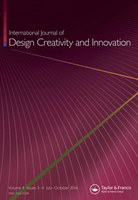
International Journal of Design Creativity and Innovation
Scope & Guideline
Igniting Creative Solutions for Tomorrow's Challenges
Introduction
Aims and Scopes
- Interdisciplinary Design Research:
The journal focuses on research that integrates insights and methodologies from various fields, including engineering, psychology, and business, to foster innovation in design. - User-Centered Design Approaches:
A significant emphasis is placed on user-centered methodologies in design processes, ensuring that the needs and experiences of end-users are central to innovation efforts. - Sustainability in Design:
The journal highlights the importance of sustainability, exploring how design practices can contribute to sustainable development and circular economy principles. - Technological Integration in Design:
Research on the impact of emerging technologies, such as AI, VR, and generative design tools, on the design process and creativity is a core focus area. - Creativity Assessment and Management:
The journal investigates various frameworks and tools for assessing and managing creativity within design contexts, aiming to improve creative outcomes in practice. - Cultural and Social Contexts of Design:
Exploration of how cultural, social, and environmental factors influence design creativity and innovation is a recurring theme in the journal.
Trending and Emerging
- Impact of AI on Design Creativity:
Recent studies are emphasizing the role of AI and machine learning in enhancing human creativity and ideation processes, reflecting the growing integration of technology in design. - Collaborative and Co-Design Practices:
There is a rising trend in research exploring collaborative design methodologies, particularly in community-based projects and interdisciplinary teams, showcasing the importance of collective creativity. - Sustainability and Circular Design:
Research focusing on sustainability-oriented design practices, including circular economy principles, is gaining traction, highlighting the need for environmentally responsible innovation. - Psychological and Emotional Factors in Design:
Emerging studies are increasingly examining the psychological aspects of creativity and the influence of emotional states on design outcomes, shedding light on the human factors in design processes. - Generative Design Tools and Techniques:
The application of generative design tools is becoming a prominent theme, with research exploring how these technologies can foster creativity and innovation in product design.
Declining or Waning
- Traditional Design Methods:
There is a noticeable decline in publications focusing solely on traditional design methodologies, such as manual sketching or basic CAD processes, as newer technologies and approaches gain traction. - Static Design Processes:
Research that emphasizes static or linear design processes is becoming less prevalent, with more emphasis on dynamic and iterative methodologies that incorporate feedback and adaptability. - Narrowly Focused Case Studies:
While case studies remain important, there is a shift away from narrowly focused case studies that do not integrate broader theoretical frameworks or interdisciplinary insights. - Design Education in Isolation:
Topics addressing design education without a connection to industry practices or real-world applications are appearing less frequently, indicating a preference for more integrative approaches. - Historical Perspectives on Design:
Explorations of historical design practices or retrospective analyses are declining, as the journal pivots towards more contemporary and forward-thinking design challenges.
Similar Journals
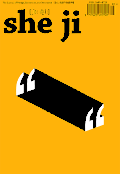
She Ji-The Journal of Design Economics and Innovation
Advancing Knowledge at the Intersection of Creativity and ValueShe Ji - The Journal of Design Economics and Innovation is a pioneering Open Access journal published by Elsevier since 2015, based in the Netherlands. With its unique focus on the intersection of design, economics, and innovation, this journal serves as a vital platform for researchers, professionals, and students who are keen on understanding the complexities of designing value-creating innovations. Consistently recognized for its high impact, She Ji holds a prestigious Q1 quartile ranking in both Economics and Education, while maintaining a strong presence in Management of Technology and Innovation and the Visual Arts sector. This reflects its commitment to fostering interdisciplinary dialogue and advancing knowledge in the rapidly evolving fields of design and economic theory. Researchers seeking to disseminate their work can benefit from the journal's robust open access model, ensuring wide visibility and accessibility to their findings. With a commitment to excellence, She Ji continues to shape thought leadership in its field and is an essential resource for anyone involved in the integration of design thinking with economic innovation.

International Journal of Design
Unveiling Cutting-edge Insights in DesignThe International Journal of Design, published by National Taiwan University of Science and Technology, is a premier open-access journal that has been contributing to the field since 2007. With an ISSN of 1991-3761 and E-ISSN of 1994-036X, this journal focuses on the interdisciplinary nature of design and its applications across various domains including Computer Graphics, Industrial and Manufacturing Engineering, as well as Visual Arts. The journal has consistently achieved high rankings, including being placed in the top quartile (Q1) for several categories in 2023, reflecting its significance in academia and its impact on contemporary design research. Offering wide-ranging access options, the International Journal of Design serves as a valuable resource for researchers, professionals, and students looking to explore innovative design practices and theories. With its scope spanning both artistic and industrial applications, this journal is dedicated to fostering advancements in design and providing a platform for scholarly discussions that bridge the gap between theory and practice.
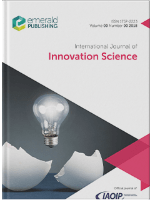
International Journal of Innovation Science
Unleashing Potential in Innovation ScienceThe International Journal of Innovation Science is a distinguished academic platform dedicated to advancing the fields of engineering and management of technology and innovation. Published by Emerald Group Publishing Ltd in the United Kingdom, this journal holds a prestigious Q1 ranking in Engineering (Miscellaneous) and a Q2 ranking in Management of Technology and Innovation as of 2023, evidencing its substantial contribution to these vital areas of research. Since its inception in 2010, the journal has fostered an environment for rigorous scholarly discourse, providing a valuable resource for researchers, professionals, and students eager to explore innovative methodologies and theoretical advancements. Although it currently does not offer open access options, its compelling influence is reflected in its Scopus ranks, with a notable 84th percentile in General Engineering and a 73rd percentile in Management of Technology and Innovation. As the journal looks towards 2024, it continues to be a pivotal publication for those dedicated to the pursuit of knowledge and practical improvements in innovation science.

ICONARP International Journal of Architecture and Planning
Elevating discourse on modern urban living and design.ICONARP International Journal of Architecture and Planning is an esteemed open-access publication that serves as a pivotal platform for fostering innovative research and discussions in the fields of architecture and urban design. Published by KONYA TECHNICAL UNIVERSITY, FACULTY OF ARCHITECTURE & DESIGN, this journal has been committed to the dissemination of high-quality academic work since 2013, promoting accessibility and global collaboration among researchers, professionals, and students. With its rigorous peer-review process and a focus on contemporary architectural and planning challenges, ICONARP seeks to contribute significantly to scholarly discourse and practical applications within the built environment. The journal is indexed in various scientific databases, enhancing its visibility and impact in the academic community. By appealing to a diverse audience, ICONARP encourages interdisciplinary studies and innovative solutions that address the complexities of modern architecture and urban living.
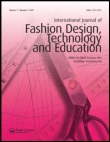
International Journal of Fashion Design Technology and Education
Exploring the Intersection of Design, Technology, and LearningThe International Journal of Fashion Design Technology and Education, published by Taylor & Francis Ltd, stands at the forefront of research in the dynamic fields of fashion design, technology, and education. Since its inception in 2008, the journal has provided a vital platform for researchers, educators, and practitioners to share innovative findings, pedagogical strategies, and technological advancements within the fashion industry. With an impressive impact factor and categorizations in the Q1 and Q2 quartiles across multiple disciplines—including Visual Arts, Education, and Industrial Engineering—this journal not only offers insightful contributions to academia but also informs practical applications in the ever-evolving fashion landscape. Although currently non-open access, the journal remains accessible to a wide range of audiences, facilitating a deeper engagement with contemporary issues in fashion technology and education. As the journal converges its themes through to 2024, it continues to encourage submissions that push the boundaries of knowledge and creativity, making it an essential resource for anyone invested in the future of fashion.
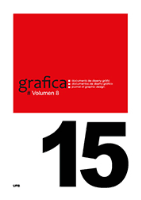
Grafica-Journal of Graphic Design
Advancing the Art of Visual CommunicationWelcome to the Grafica-Journal of Graphic Design, a premier publication dedicated to advancing the field of graphic design and visual arts. Published by UNIV AUTONOMA BARCELONA in Spain, this Open Access journal has been a vital resource for scholars and practitioners since 2013, making impactful research freely available to a global audience. The journal's scope encompasses a broad range of topics within graphic design, visual communication, and the overlapping domains of computer graphics, offering invaluable insights for researchers, educators, and industry professionals alike. With an impressive reputation reflected in its categorization, including Q1 in Visual Arts and Performing Arts and Q3 in Communication for 2023, Grafica stands out in terms of academic rigor and relevance. Currently indexed in Scopus, the journal holds significant rankings that underscore its impact within the Arts and Humanities as well as Social Sciences. By bridging artistic innovation and practical application, Grafica serves as an essential platform for the exchange of ideas, fostering creativity and collaboration within the vibrant community of graphic design.

Journal of Usability Studies
Bridging theory and practice in usability and design.The Journal of Usability Studies, published by the USERS EXPERIENCE PROFESSIONAL ASSOCIATION, is a pivotal platform for researchers and professionals dedicated to advancing the field of usability and user experience design. With an ISSN of 1931-3357, this journal offers a collection of peer-reviewed articles that explore innovative methodologies, emerging technologies, and applied research in usability studies. Though it operates under a traditional access model, the journal remains dedicated to fostering a detailed understanding of how users interact with systems and products. The Journal of Usability Studies is instrumental for those aiming to enhance user satisfaction through research-backed insights, making it a vital resource for academics, practitioners, and students seeking to contribute to the evolving discourse in human-computer interaction and usability engineering.

Journal of the Association for Information Systems
Advancing the Frontiers of Information Systems ResearchThe Journal of the Association for Information Systems (ISSN: 1536-9323, E-ISSN: 1558-3457) is a premier academic publication dedicated to advancing the field of information systems and computer science applications. Published by the Association for Information Systems in the United States, this journal has established itself as a leading source of cutting-edge research, evidenced by its strong impact factor and recognition as a Q1 journal in both Computer Science Applications and Information Systems categories for 2023. With a commendable Scopus ranking of #82/817 in Computer Science Applications (90th percentile) and #43/394 in Information Systems (89th percentile), the journal serves as a vital platform for the dissemination of innovative ideas and practices that shape contemporary information systems research. Although it operates on a traditional access model, the journal remains committed to fostering scholarly communication and providing insights that are instrumental for researchers, professionals, and students alike. Its scope encompasses a diverse range of topics within the field, making it an essential resource for anyone seeking to deepen their understanding of information systems in our rapidly evolving digital landscape.
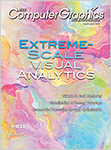
IEEE COMPUTER GRAPHICS AND APPLICATIONS
Bridging Theory and Practice in Visual ComputingIEEE Computer Graphics and Applications is a premier journal published by the IEEE Computer Society, focusing on the rapidly evolving fields of computer graphics and computer-aided design. With an established history since 1981, this journal has become a vital platform for disseminating innovative research and applications that bridge theory and practice. It is indexed in Scopus, holding a respectable rank of #49 in Computer Graphics and Computer-Aided Design and #250 in Software, reflecting its significant contribution to the academic community with a notable 54th and 38th percentile, respectively. While it currently operates without open access options, the journal continues to provide valuable insights that cater to researchers, professionals, and students alike, striving to push the boundaries of technology and creativity. With plans to converge until 2024, IEEE Computer Graphics and Applications remains committed to fostering advancements in the discipline, making it an essential resource for those at the forefront of computer graphics innovation.
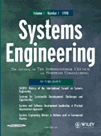
Systems Engineering
Advancing Knowledge in Computer Networks and Hardware ArchitectureSystems Engineering, published by WILEY, stands as a leading journal in the realms of Computer Networks and Communications and Hardware and Architecture, holding a Q2 quartile ranking in the former and a Q3 in the latter as of 2023. With its ISSN of 1098-1241 and E-ISSN 1520-6858, this journal has provided a vital platform for peer-reviewed research since its inception in 1998. Aimed at fostering knowledge and innovation, Systems Engineering caters to researchers, professionals, and students who are keen to explore the complexities and developments in systems design and optimization. The journal’s rigorous standards and strategic position in Scopus rankings—#148 in Computer Networks and Communications and #67 in Hardware and Architecture—underscore its significance and impact within the academic community. While currently not offering Open Access options, the journal remains committed to disseminating pioneering research that contributes to advancing the field.